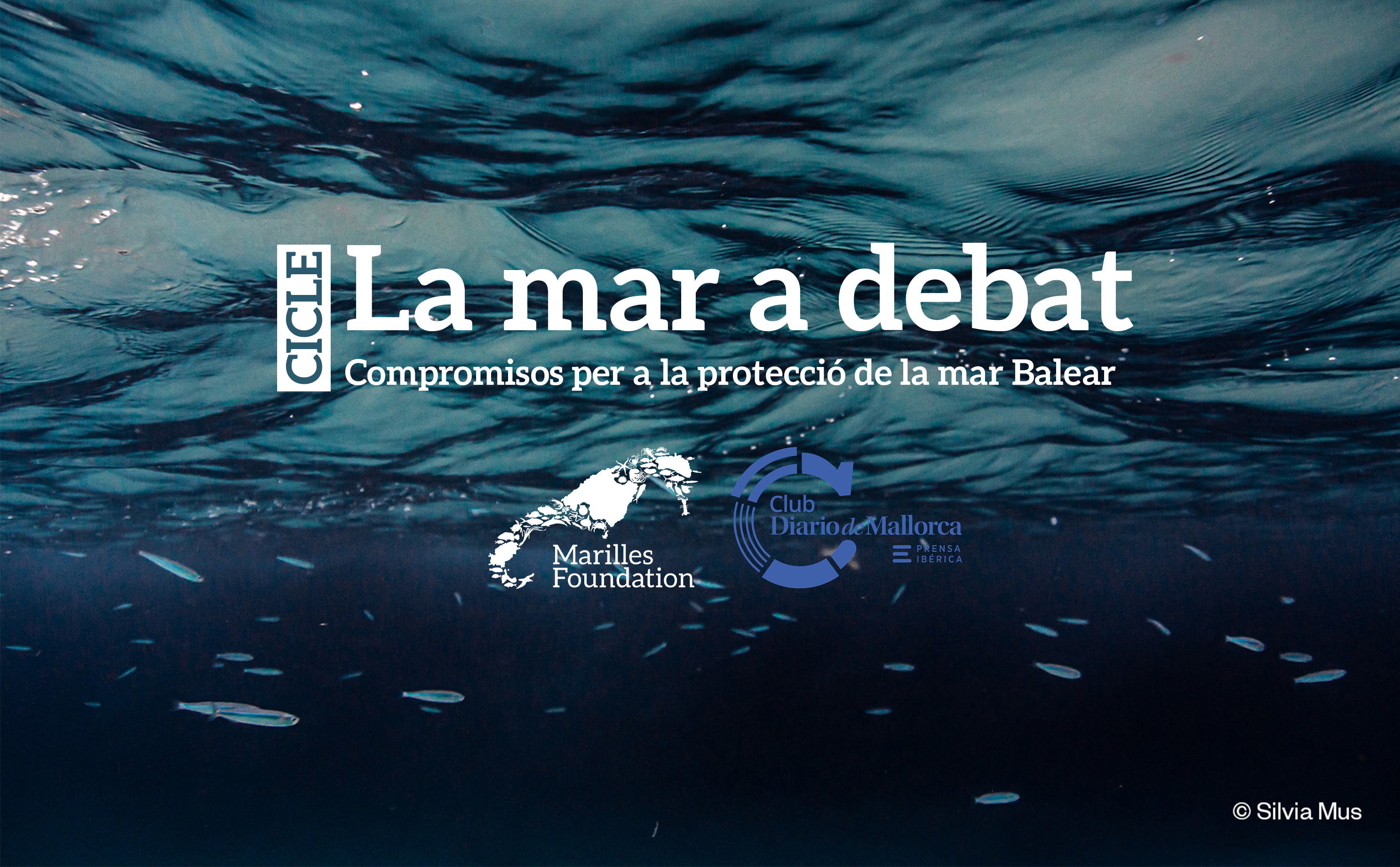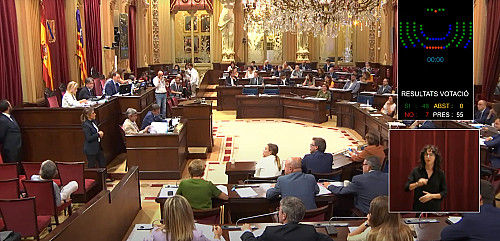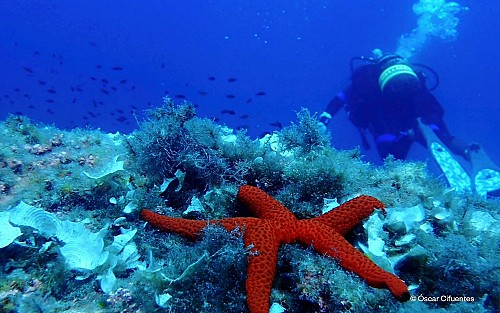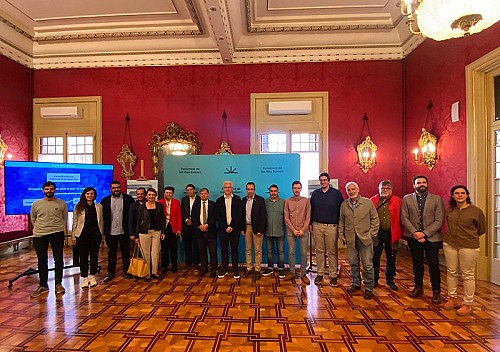Fishers, business people, politicians, yacht club members, and organised citizens seek solutions to conserve the Balearic Sea.
Published 30.04.2023
Share

Eighteen representatives from different sectors related to the marine environment sat down to talk about marine management in a cycle of debates organised by Marilles Foundation. The series took place over four months and counted on the active participation of the public who have attended.
In the first months of 2023, together with Diario de Mallorca, we organised the cycle of debates The Sea under Debate to put key issues for the Balearic Sea on the table: sustainable fishing, nautical issues, the economic and demographic model, and, finally, the commitments towards marine conservation that the political parties will adopt for the next elections.
We collected many points of view, suggestions, and proposals, which can be summarised in a consensus: We must work to make the Balearic Islands a world reference in marine conservation. Or, as Aniol Esteban, director of Marilles, explained at the last meeting: "We have all accepted the diagnosis and the challenges, but there are differences in how to work to improve the health of the sea."
Experts involved in the fishing, nautical, tourism, economic, and political sectors shared data, proposals and points of view. Never before has there been such an extensive and multidisciplinary public dialogue on the state of the sea and the challenges posed by its management. Aniol Esteban opened each debate with a presentation to contextualise the theme of the session, with data, proposals, and challenges. After each introduction, in roundtables, representatives of the sectors involved commented on the proposals and challenges raised in the introduction, and finally the public contributed their thoughts through interactive tools.
TOWARDS SUSTAINABLE FISHERIES
The Balearic fisheries meet the conditions to become the most sustainable in the Mediterranean, if protection measures are applied and sufficient resources are allocated to manage and control the protected areas. All the representatives of the fishing sector who debated the sea in January agreed on this: The president of the Balearic Federation of Fishermen's Guilds (FBCP), Domingo Bonnín; the manager of the Ibiza Fishermen's Guild, Marga Serra; the head of the Marine Resources Service of the Balearic government's Directorate General for Fisheries, Toni Grau; and the president of the Spanish Responsible Recreational Alliance, Bernadí Alba.
The Balearic Islands are pioneers in the implementation of marine protected areas. The participants in the debate agreed that this figure is a guarantee for the regeneration of the fish population. In this sense, Aniol Esteban recalled the 30x30 objective set by the European Union (a minimum of the sea protected by 2030) and the 10% of waters highly protected.
Participants also agreed on the need to improve the collection and processing of data on the volume of catches generated by recreational fishing, which is key information for managing this type of fishing.
They also called for more resources to be allocated to prevent poaching and to promote the value of local products.
Along the same lines as the speakers, the proposals most voted for by the audience to move towards a sustainable fishing model that is an international benchmark were as follows:
- Design new marketing models to value and facilitate the consumption of sustainable and local products.
- Facilitate the entry of new generations into the fisheries sector.
- Invest in surveillance and control to put an end to illegal fishing and marketing.
The full debate can be retrieved here.
TOWARDS AN INVOLVED NAUTICAL SECTOR
In the debate dedicated to the nautical sector, held in February, Aniol Esteban pointed out three challenges for the nautical sector to become a benchmark in sustainability:
1) Achieve a good coexistence with the coastline in a context of the high density of boats in anchorage areas.
2) Reduce the impact of anchoring, pollution, and engine noise on vulnerable habitats.
3) Involve the sector itself in the conservation and regeneration of the sea.
Debate participants: Gabriel Dols, president of FanMed; Ferran Muniesa, director of the Club Náutico Arenal; Daniela Weber, president of the Association of Nautical Brokers of the Balearic Islands; and Juan Vicente Rosselló, manager of Ports of the Balearic Islands.
All agreed that more dialogue is needed to address problems such as saturation or dumping of boats at sea (according to the BALEARIC SEA REPORT (IMB) there are more than 24,000 moorings with a fleet of some 35,000 boats that increase by more than 10% during the summer). They also regretted that the public administration does not have sufficient means to control saturation and dumping and called for more public-private communication.
The public, for their part, voted for the following proposals:
- Use yacht clubs as schools of the sea (spaces for dissemination and awareness-raising).
- Increase the regulation of impacts (limiting speeds, driving without a licence, underwater noise...).
- Invest more resources in surveillance and control at sea to ensure compliance with regulations.
The full debate can be retrieved here.
TOWARDS A CHANGE OF ECONOMIC AND DEMOGRAPHIC MODEL
Aniol Esteban used figures to explain the growing demographic pressure in terms of both tourists and residents, the increase in cruise ships and vehicles, and remarked: "There is an asymmetry between the benefits that the sea gives us and what is invested in its conservation (...) all this in a context of climatic emergency where in 2022 alone there have been five marine heat waves."
Maria Gibert, manager of HABTUR; Jorge Forteza, vice-president of ABINI; Catalina Alemany, director of corporate social responsibility of the Riu Group; and Celestí Alomar, representative of the Civil Society Forum, shared a roundtable in this third debate, which revolved around economic and demographic solutions to guarantee a model that respects both the territory and the sea.
Participants in the debate recognised that saturation harms not only residents, but also tourism, and proposed measures such limiting the entry of visitors, controlling illegal supply, or improving public transport.
The public posed the following reflection: "How do we think we will live in the Balearic Islands that we have planned, with a ceiling of about 3 million inhabitants?" and the most voted proposal was "Revise the systems of indicators on which we base our success to include more visions apart from the economic one (natural capital index, HPI...)".
The full debate can be retrieved here.
TOWARDS POLITICAL COMMITMENT
After taking the pulse of the main economic sectors involved in the sea (fishing, nautical, and tourism), the last event of the cycle focused on the proposals of the different political parties to conserve the marine environment. Speakers included Marc Pons (PSIB), Miquel Mir (MÉS); Juan Manuel Gómez Gordiola (Ciudadanos); Maria Antònia Sureda (El Pi); Aurora Ribot (Unidas Podemos); and Toni Costa (PP).
A final debate that served to gather the conclusions of the previous ones, where the main axes for marine conservation were put on the table:
- Improved and extended marine protected areas.
- Programmes for the conservation and restoration of vulnerable habitats and species.
- Consolidation and guarantee of sustainable fishing.
- Improved water quality.
- Improved funding for marine conservation.
These are the five axes that make up the Balearic Blue Pact, a pact that asks political parties to assume these five commitments and civil society to give their support in order to conserve the extraordinary source of wealth that is the sea that surrounds us. Promoting protection measures based on scientific criteria was one of the ideas that all the participants in the final debate supported.
The audience took the opportunity to put questions to the political representatives. They were interested in the following topics:
- Environmental limits to the Balearic Islands.
- Tourism and the nautical sector investing part of the profits in marine conservation.
- The importance of 30x30x10 protection, especially the 'highly protected' part.
The full debate can be retrieved here.




